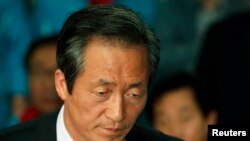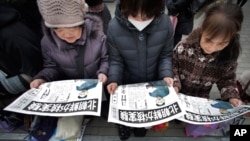SEOUL —
North Korea's claim this week to have successfully conducted a third underground nuclear test is prompting some in South Korea and Japan to advocate possessing their own such weapons.
South Korean lawmaker Chung Mong-joon of the governing Saenuri (New Frontier) party made such a remark during a meeting of his colleagues from the National Assembly, comparing the situation with North Korea to “a gangster in the neighborhood buying a brand-new machine gun” and trying to defend oneself with merely a pebble.
Chung is no fringe politician. He is the country's wealthiest lawmaker through his controlling shares in the Hyundai Heavy Industries group.
The JoongAng Ilbo, major South Korean newspaper, terming North Korea's latest test an existential threat to Seoul, questions whether the country should arm itself with nuclear weapons and if the United States will ultimately protect it if Pyongyang were to threaten a nuclear attack.
A spokesman for the opposition Democratic United Party, Park Yong-jin, criticizes the ruling party for failing during the past it is not possible to solve the problem of North Korea's nuclear program with a South Korean nuclear armament.
Another option is reintroducing U.S. nuclear weapons onto the Korean peninsula.
But South Korea “is not considering bringing in tactical nuclear weapons right now because the priority is to make North Korea give up its nuclear armament,” says Defense Ministry spokesman Kim Min-seok.
The nuclear debate is not limited to South Korea.
Japan also concerned
Former four-term Tokyo governor Shintaro Ishihara, now a member of parliament, and co-leader of the Japan Restoration Party, has openly stated his country should have nuclear bombs to counter China, North Korea and Russia.
In a VOA interview just hours after North Korea announced its latest nuclear test, Japanese defense minister Itsunori Onodera commented that his country's pacifist constitution restricts Tokyo “when it comes to having nuclear weapons” and thus strengthening the U.S.-Japan security alliance is the key response.
Prime Minister Shinzo Abe, however, is among those advocating revision of Article 9 of the constitution which prohibits Japan from maintaining a war potential.
Getting China's attention
Some international observers contend the pro-nuclear statements from Seoul and Tokyo are in part intended to get the attention of policy makers in Beijing.
“I'd really like to think that that's really what's happening is that their trying to make a political statement to try to get China interested in dealing with the problem,” says
Carl Baker, director of programs at the Pacific Forum of the Center for Strategic and International Studies, a bi-partisan U.S. think tank. “Ultimately the politicians in Seoul and Tokyo believe that the only way we're going to get North Korea really interested in not pursuing nuclear weapons further is by having China tell them to stop.”
Non-Proliferation Treaty
Baker, a former political and economic analyst for U.S. Forces Korea, cautions that any moves by South Korea or Japan to initiate a nuclear weapons program would not find approval in Washington.
“It'll be received very negatively because we have, of course, always ensured South Korea and Japan that we provide an extended deterrent capacity to them,” he says. “There is the Non-Proliferation Treaty which requires people who don't possess nuclear weapons to not possess nuclear weapons. For South Korea and Japan to basically disregard the treaty would be a very bad step.”
Both countries are protected under the U.S. nuclear umbrella and host thousands of American troops and several major military bases.
Despite that, South Korea and Japan in past decades appear to have considered clandestine nuclear weapons development.
Secret programs
A secret South Korean program under a “weapons exploration committee” during the dictatorship of the late President Park Chung-hee existed in the 1970s. His daughter, Park Geun-hye, is to be inaugurated as president February 25, succeeding Lee Myung-bak, who was limited to a single five-year term.
The International Atomic Energy Agency in 2004 concluded that South Korean scientists, in previous years, had produced a very small amount of fissile material that could have been placed in a weapon.
South Korea's government at the time contended it had not authorized the experiments.
Japan reportedly undertook, in the 1960s, a secret study on building nuclear weapons.
Prime Minister Tsutomu Hata in 1974 stated Japan certainly had such a scientific capability. In 2006, then foreign minister Taro Aso repeated that assertion and argued Article 9 did not prohibit Japan from having nuclear weapons for self defense.
Aso would later become a prime minister and is currently the deputy prime minister and finance minister.
Both South Korea and Japan each have dozens of commercial nuclear power plants - a potential source of ample fuel for such weapons.
South Korea wants revision of its atomic energy agreement with the United States to allow Seoul to reprocess spent fuel to use in future fast breeder reactors and reduce its stored nuclear waste. Washington has resisted altering the pact amid fears that the fuel could be used for nuclear weapons.
Talks on the agreement are expected to be held after the new Park administration takes office.
In Japan, a former overseer of the country's atomic energy program told VOA, on condition he not be named, that he has been approached by several influential lawmakers asking him how quickly the country, with its highly advanced technology, would be able to construct a viable nuclear weapon.
Officials in Tokyo and abroad have been quoted anonymously in the past as saying the answer to that question would be six months or less.
Youmi Kim in the VOA Seoul bureau contributed to this report.
South Korean lawmaker Chung Mong-joon of the governing Saenuri (New Frontier) party made such a remark during a meeting of his colleagues from the National Assembly, comparing the situation with North Korea to “a gangster in the neighborhood buying a brand-new machine gun” and trying to defend oneself with merely a pebble.
Chung is no fringe politician. He is the country's wealthiest lawmaker through his controlling shares in the Hyundai Heavy Industries group.
The JoongAng Ilbo, major South Korean newspaper, terming North Korea's latest test an existential threat to Seoul, questions whether the country should arm itself with nuclear weapons and if the United States will ultimately protect it if Pyongyang were to threaten a nuclear attack.
A spokesman for the opposition Democratic United Party, Park Yong-jin, criticizes the ruling party for failing during the past it is not possible to solve the problem of North Korea's nuclear program with a South Korean nuclear armament.
Another option is reintroducing U.S. nuclear weapons onto the Korean peninsula.
But South Korea “is not considering bringing in tactical nuclear weapons right now because the priority is to make North Korea give up its nuclear armament,” says Defense Ministry spokesman Kim Min-seok.
The nuclear debate is not limited to South Korea.
Japan also concerned
Former four-term Tokyo governor Shintaro Ishihara, now a member of parliament, and co-leader of the Japan Restoration Party, has openly stated his country should have nuclear bombs to counter China, North Korea and Russia.
In a VOA interview just hours after North Korea announced its latest nuclear test, Japanese defense minister Itsunori Onodera commented that his country's pacifist constitution restricts Tokyo “when it comes to having nuclear weapons” and thus strengthening the U.S.-Japan security alliance is the key response.
Prime Minister Shinzo Abe, however, is among those advocating revision of Article 9 of the constitution which prohibits Japan from maintaining a war potential.
Getting China's attention
Some international observers contend the pro-nuclear statements from Seoul and Tokyo are in part intended to get the attention of policy makers in Beijing.
“I'd really like to think that that's really what's happening is that their trying to make a political statement to try to get China interested in dealing with the problem,” says
Carl Baker, director of programs at the Pacific Forum of the Center for Strategic and International Studies, a bi-partisan U.S. think tank. “Ultimately the politicians in Seoul and Tokyo believe that the only way we're going to get North Korea really interested in not pursuing nuclear weapons further is by having China tell them to stop.”
Non-Proliferation Treaty
Baker, a former political and economic analyst for U.S. Forces Korea, cautions that any moves by South Korea or Japan to initiate a nuclear weapons program would not find approval in Washington.
“It'll be received very negatively because we have, of course, always ensured South Korea and Japan that we provide an extended deterrent capacity to them,” he says. “There is the Non-Proliferation Treaty which requires people who don't possess nuclear weapons to not possess nuclear weapons. For South Korea and Japan to basically disregard the treaty would be a very bad step.”
Both countries are protected under the U.S. nuclear umbrella and host thousands of American troops and several major military bases.
Despite that, South Korea and Japan in past decades appear to have considered clandestine nuclear weapons development.
Secret programs
A secret South Korean program under a “weapons exploration committee” during the dictatorship of the late President Park Chung-hee existed in the 1970s. His daughter, Park Geun-hye, is to be inaugurated as president February 25, succeeding Lee Myung-bak, who was limited to a single five-year term.
The International Atomic Energy Agency in 2004 concluded that South Korean scientists, in previous years, had produced a very small amount of fissile material that could have been placed in a weapon.
South Korea's government at the time contended it had not authorized the experiments.
Japan reportedly undertook, in the 1960s, a secret study on building nuclear weapons.
Prime Minister Tsutomu Hata in 1974 stated Japan certainly had such a scientific capability. In 2006, then foreign minister Taro Aso repeated that assertion and argued Article 9 did not prohibit Japan from having nuclear weapons for self defense.
Aso would later become a prime minister and is currently the deputy prime minister and finance minister.
Both South Korea and Japan each have dozens of commercial nuclear power plants - a potential source of ample fuel for such weapons.
South Korea wants revision of its atomic energy agreement with the United States to allow Seoul to reprocess spent fuel to use in future fast breeder reactors and reduce its stored nuclear waste. Washington has resisted altering the pact amid fears that the fuel could be used for nuclear weapons.
Talks on the agreement are expected to be held after the new Park administration takes office.
In Japan, a former overseer of the country's atomic energy program told VOA, on condition he not be named, that he has been approached by several influential lawmakers asking him how quickly the country, with its highly advanced technology, would be able to construct a viable nuclear weapon.
Officials in Tokyo and abroad have been quoted anonymously in the past as saying the answer to that question would be six months or less.
Youmi Kim in the VOA Seoul bureau contributed to this report.








